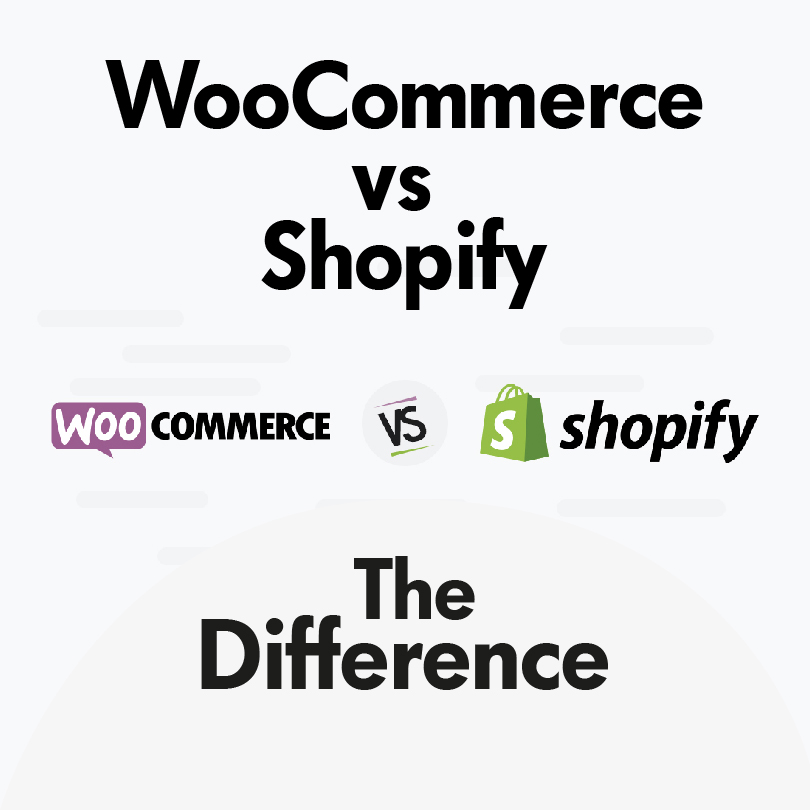
WooCommerce vs Shopify: Which will be Better in 2021
WooCommerce vs Shopify is a showdown between two eCommerce titans. WooCommerce and Shopify are the top eCommerce platforms in the world each with its own pros and cons. As a market owner, picking the best eCommerce platform that fits your business indigence’s is crucial for your success.
In this article, we will show you a complete contrast of WooCommerce vs Shopify. The aim is to break down their pros and cons to help you pick the best option for your eCommerce store.

WooCommerce vs Shopify: The Difference
When you explore through Google for reviews of Shopify and WooCommerce, you’ll see a lot of views from different business owners. While these acumens can be helpful, the truth is that whether you want WooCommerce vs Shopify will boil down to some core variations.
For example, the main difference between Shopify and WooCommerce is that Shopify is an all-in-one eCommerce solution invented to give you everything you require to get started online. Shopify takes the difficulties and technical aspects out of managing an online business and replaces them with easy-to-use tools. Your Shopify store can be set up and working in a matter of minutes. Though, this also implies that you’re not going to get as much granular control over your website.
On the other side, if you’re searching for more customization options, WooCommerce is a self-hosted platform for eCommerce. This implies that you can tap into the code and access several parts of your store. WooCommerce provides you a lot of freedom to assemble everything into your store, which’s important for your team. It also suggests that you can run your sales in association with a WordPress blog.
Cost
Shopify makes it super easy to begin your online business. Their simple plan starts at $29/month, and you can enhance to the Shopify plan for $79 or the advanced plan for $299/month.
WooCommerce is an eCommerce plugin for WordPress.org (also recognized as self-hosted WordPress). It is open-source and freely usable as a WordPress plugin. Though you will require a domain name, a WordPress hosting account, and an SSL Certificate to start a WooCommerce store. Basically, a domain name costs $14.99, web hosting costs $7.99 / month, and an SSL Certificate costs $69.99. This is not low, especially when you are just starting out.
Ease of Use
There’s small doubt that WooCommerce has a steeper learning curve than Shopify, and from our research, Shopify is surely simpler to get to grips with for a regular user. In our experiment, Shopify scored 4.1 out of 5 and WooCommerce scored 3.5 out of 5, which describes all you have to know.
WooCommerce is a far more technical store that will need a certain level of knowledge to work, or a readiness to spend some time learning. In opposition, Shopify is available to the everyday person, and you don’t require to know how to code to get the most out of it.
Design
With WooCommerce, you have some methods to customize your business’s functionality:
- Your theme
- The 50k plus WordPress plugins, including extensions that are particularly created for WooCommerce
- Custom code (one of the advantages of a self-hosted feature)
Similarly WooCommerce, you can customize your Shopify platform with:
- Themes – you can see both themes at the Shopify Theme Store as well as third-party themes.
- Apps – these are alike to WordPress plugins in concept and are all gathered at the Shopify website.
Shopify also allows you to add custom HTML but only to your platform’s homepage, which is certainly a limiting factor.
Payment Methods
Because of WooCommerce’s open-source feature and big plugin community, you can get a ton of WooCommerce payment gateways.
First, WooCommerce supports all the famous gateways including:
- PayPal
- Stripe
- Authorize.Net
- Square
Shopify has its personal payment gateway that typically needs zero configuration. But if you’d favor using a third-party payment gateway, Shopify also allows all the greater including:
- Stripe
- PayPal
- Authorize.Net

Who Controls Your Data On Each Platform?
Because WooCommerce is self-hosted, it provides you significantly more control and ownership of your data.
WooCommerce: There’s not much we require to write here – with WooCommerce you control everything. That means, if required, you can even delve into your database and control the raw data.
Shopify: While Shopify does provide you access to all of your data, the live copy still remains on Shopify’s servers. That implies you never really wholly control your data.
With that being stated, Shopify does give you lots of techniques to access your data, which is greater than many hosted platforms. You can:
- Export a CSV list of your products
- Connect with your data through an API
- Back up your website via an app
FAQs
The plugin of Shopify Connect for WooCommerce enables you to combine your Shopify goods as a WooCommerce store on your WooCommerce platform, and addresses your buying through Shopify, creating WooCommerce your catalog. You perceive the added features of WooCommerce including linked products, reviews, etc.
Overall, it's clear that WooCommerce can cope with the big product bases and, if correctly configured, can work with the bases of 50K to 100K, or more stocks.
Overall reviews. Shopify is the best eCommerce program in the business today. It's intended to help people build their personal, scalable online store with lots of built-in features and kind of apps. You can market products straight on your site, and across many marketplaces and social media.
No, but you can use it with their 14-day free trial. During the trial period, you can build your store and present it available to the public. Shopify is a vast cloud-based choice with cheap startup costs and a simple-to-use interface from which you can advertise, sell, and ship your goods.

